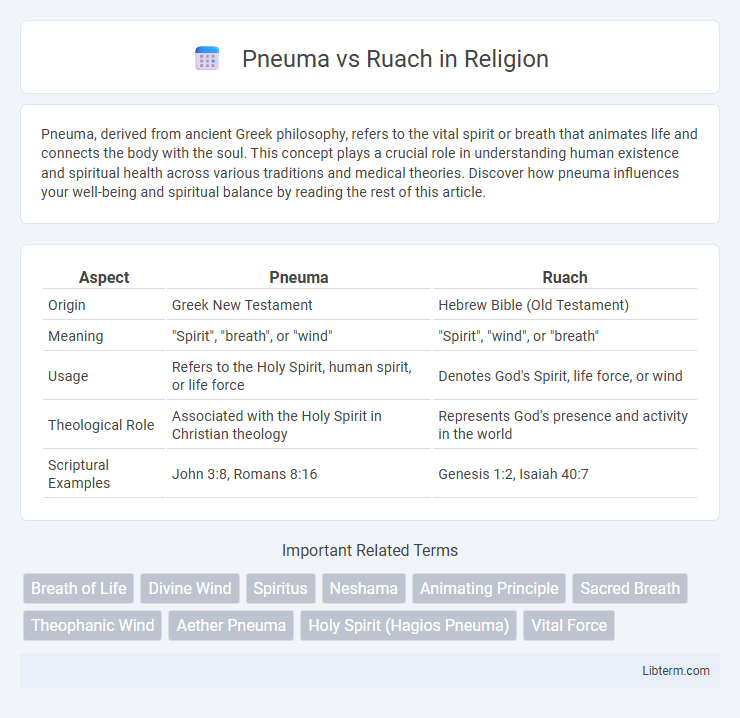Pneuma, derived from ancient Greek philosophy, refers to the vital spirit or breath that animates life and connects the body with the soul. This concept plays a crucial role in understanding human existence and spiritual health across various traditions and medical theories. Discover how pneuma influences your well-being and spiritual balance by reading the rest of this article.
Table of Comparison
| Aspect | Pneuma | Ruach |
|---|---|---|
| Origin | Greek New Testament | Hebrew Bible (Old Testament) |
| Meaning | "Spirit", "breath", or "wind" | "Spirit", "wind", or "breath" |
| Usage | Refers to the Holy Spirit, human spirit, or life force | Denotes God's Spirit, life force, or wind |
| Theological Role | Associated with the Holy Spirit in Christian theology | Represents God's presence and activity in the world |
| Scriptural Examples | John 3:8, Romans 8:16 | Genesis 1:2, Isaiah 40:7 |
Introduction to Pneuma and Ruach
Pneuma and Ruach both signify "spirit" or "breath" in ancient languages, with Pneuma rooted in Greek and Ruach derived from Hebrew. Pneuma is often associated with the concept of life force or spirit in Greek philosophy and early Christian theology, emphasizing the intangible essence that animates living beings. Ruach in Hebrew tradition similarly denotes spirit, wind, or breath, carrying deep theological significance in biblical texts as the divine breath that imparts life and wisdom.
Etymology and Linguistic Roots
Pneuma" originates from the Greek word pneuma, meaning "breath," "spirit," or "wind," and is etymologically linked to the verb pneo, which means "to blow" or "breathe." "Ruach," from Hebrew rvHa, also conveys "breath," "wind," or "spirit," rooted in Semitic language traditions emphasizing life force and divine presence. Both terms reflect ancient understandings of invisible forces essential to life and spirituality, with Pneuma shaping Hellenistic philosophical and Christian theological concepts, while Ruach underpins Hebrew biblical interpretations of spirit and breath.
Pneuma in Ancient Greek Thought
Pneuma in Ancient Greek thought represents the vital breath or spirit, functioning as the essential life force permeating the cosmos and human beings, distinct from Ruach in Hebrew tradition which emphasizes divine wind or breath. Philosophers like Stoics conceptualized Pneuma as the rational, animating principle governing both the body and the universe, integrating physical and spiritual dimensions in their metaphysical framework. This conceptualization influenced medical and philosophical discourses on soul, pneumatology, and natural philosophy within Hellenistic culture.
Ruach in Hebrew Scriptures
Ruach, a Hebrew term frequently found in the Hebrew Scriptures, signifies breath, wind, or spirit and represents God's dynamic presence and life-giving force. Unlike Pneuma, a Greek term often associated with spiritual aspects in the New Testament, Ruach emphasizes God's active power in creation, prophecy, and renewal throughout the Old Testament. Key biblical instances include Genesis 1:2, where Ruach Elohim hovers over the waters, symbolizing divine vitality and creative energy.
Comparative Meaning: Spirit, Wind, and Breath
Pneuma and Ruach both signify spirit, wind, and breath, yet Pneuma in Greek emphasizes the invisible life force or divine spirit actively sustaining life and consciousness. Ruach in Hebrew similarly conveys breath and wind but carries a deeper connection to God's creative power and presence. These terms illustrate cultural nuances where Pneuma underscores animating energy, whereas Ruach highlights spiritual vitality and divine interaction.
Cultural and Theological Contexts
Pneuma and Ruach both translate to "spirit" but differ in cultural and theological nuances, with Pneuma rooted in Greek philosophy and early Christian theology emphasizing breath, life, and divine presence. Ruach, a Hebrew term, carries meanings of wind, breath, and spirit within Jewish thought, symbolizing God's creative and sustaining power. Understanding these terms illuminates their distinct roles in scriptural texts and religious traditions, highlighting how language shapes spiritual interpretation.
Usage in the Old and New Testaments
Pneuma and Ruach both denote "spirit," yet Pneuma appears predominantly in the New Testament, often signifying the Holy Spirit, breath, or life force, while Ruach is commonly used in the Old Testament, referring to the spirit of God, wind, or breath. Ruach emphasizes God's dynamic power in creation and prophecy, found extensively in books like Genesis, Ezekiel, and Psalms. Pneuma, found in Greek texts such as the Gospels and Pauline epistles, highlights spiritual gifts, inner renewal, and divine presence within believers.
Influence on Christian and Jewish Doctrine
Pneuma, a Greek term used in the New Testament, emphasizes the Holy Spirit's role in Christian doctrine as the divine presence facilitating salvation, sanctification, and inspiration. Ruach, the Hebrew equivalent in Jewish tradition, represents God's breath or spirit, central to understanding life, prophecy, and divine intervention within the Tanakh. The nuanced distinctions between Pneuma and Ruach shape theological interpretations, influencing Christian views of the Trinity and Jewish perspectives on spirit and divine will.
Pneuma vs Ruach in Modern Interpretation
Pneuma and Ruach, both meaning "spirit" in Greek and Hebrew respectively, differ in modern interpretation with Pneuma often associated with the New Testament's concept of the Holy Spirit, emphasizing divine inspiration and spiritual life. Ruach in contemporary contexts retains a broader semantic range, encompassing wind, breath, and spirit, highlighting a connection to animating life force in Jewish thought. Modern scholarship explores Pneuma as a more specialized theological term, while Ruach remains integral to cultural and linguistic discussions of spirit and vitality in ancient texts.
Conclusion: Bridging Ancient Concepts
Pneuma and Ruach, both ancient terms for spirit or breath, reveal shared concepts across Greek and Hebrew cultures emphasizing life force and divine presence. Understanding their nuanced differences enriches biblical and philosophical interpretations, highlighting overlaps in spirituality and human vitality. Bridging Pneuma and Ruach fosters deeper theological dialogue and cross-cultural insights into the nature of existence and the divine.
Pneuma Infographic

 libterm.com
libterm.com